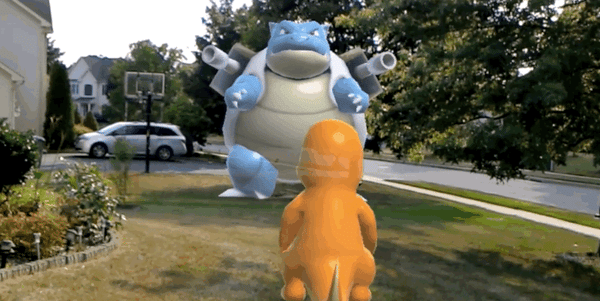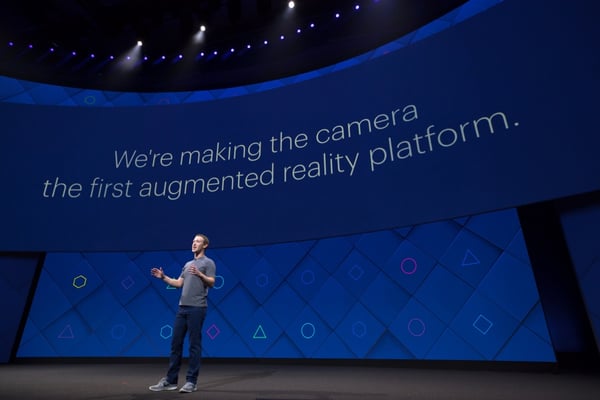Tomorrow marks the beginning of the fifth annual Oculus Connect: Facebook's annual virtual reality (VR) conference.
Facebook acquired Oculus, a maker of VR hardware like headsets, as well as certain programs that pair with it, in 2014. Some have argued that the investment has yet to show any truly measurable return for Facebook, perhaps because of VR's slow path to going mainstream.
But at Oculus Connect, we're encouraged to dream big. At last year's opening keynote, Facebook CEO Mark Zuckerberg announced his goal to have one billion people using VR -- by when, however, wasn't quite as clear.
Goal = 1 billion people in VR. #oculusconnect
— Amanda Zantal-Wiener (@Amanda_ZW) October 11, 2017
But in order to do that, VR needs to become both more accessible and affordable, the latter of which the company has addressed by way of its less expensive $199 Oculus Go headset.
What's next, then, on Facebook's path to take VR mainstream, and get it into the hands of one billion people?
We have a few ideas. Here are five predictions we have for Oculus Connect.
Note: These are purely predictions that are not based on any information from Facebook or Oculus.
1. Integration With Facebook for Dating
At Facebook's annual F8 developer conference this year, Mark Zuckerberg announced that the company would build a native dating app within Facebook.
Earlier this month, that app was unveiled for testing in Colombia. Some of the key features: the ability to see which events your potential matches might be attending or common interests you share, and finding a place to meet as a result. (Of course, there are privacy issues associated with that -- but that's another story.)
One way to create more use cases for VR -- Oculus headsets specifically -- is to merge them with features already available within Facebook. Dating could be one such use case if it's integrated with Oculus Venues: an app that allows users to experience live events (like sports games or concerts) in VR, and interact with other users who are tuning it.
Pairing Facebook for dating with Oculus Venues could be one way to help potential matches get to know each other: by creating virtual first dates within Venues to help break the ice and see if they want to meet in-person.
2. More Business Use Cases
Superstore chain Walmart recently remarked that it's putting Oculus headsets to use for workplace training, to help employees improve skills in areas like new technology, compliance, and emotional intelligence.
At last year's Oculus Connect, the opening keynote pointed to workplace use cases for VR, such as virtual meetings and offices.
Workplace training, however, didn't come up quite as much -- but there have been other business use cases for VR, such as those from Tobii Pro, which pairs VR with eye-tracking technology to help retailers learn where a shopper pays the most visual attention and plan store layout accordingly.
Walmart, for its part, is slated to ship 17,000 Oculus Go headsets to its stores, to provide every employee with access to the VR training. This year, I'm curious -- and believe it could be possible to see more business use cases, in which multiple units of Oculus headsets have been ordered and used by businesses to help with things like workplace training.
3. More Education Use Cases
Similar to workplace and B2B use cases, I'm eager to see more ways to leverage VR technology within classrooms. The company does have its Oculus Education division, and in August, it announced that it would be donating Rift and Oculus Go headsets to schools, libraries, and museums -- "to better understand how teachers, students, and various institutions can use VR for learning and collaboration."
If this strategy sounds familiar, it might be due to similar, earlier plays from other Big Tech companies. Apple also has a history of distributing mass quantities of units, like its computers, to schools. And while the company had a bumpy road to its $1 trillion valuation, some argue that it was the education distribution strategy that helped Apple amplify its brand awareness.
...especially on the large-scale distribution & standardizations side. Remember when Apple gave close to 1 billion computers to schools? https://t.co/TYQoaDwDiV
— Amanda Zantal-Wiener (@Amanda_ZW) October 18, 2017
It would be interesting to see a similar move from Oculus and hear more about these educational pilot programs during this week's keynotes -- particularly in ways that benefit underserved communities. That could point to a collaboration between Oculus Education and the company's VR for Good Creators Lab.
4. Integration With Portal, Facebook's Smart Speaker
Facebook originally planned to unveil its video smart speaker -- said to be named Portal -- at F8 in May. However, those plans were shelved after weeks of PR crises around privacy concerns.
Now, rumors are swirling that Portal will be formally announced this week, according to a scoop from Cheddar's Alex Heath. The timing seems suspect, given that Oculus Connect is also scheduled for this week -- perhaps we'll receive some official word of Portal's Debut at the VR event.
It seems odd, however, to unveil non-VR hardware at a VR-specific event. So what would make the announcement make sense? The answer to that question could exist in some sort of integration.
So, what would an integration of a video smart speaker with VR technology look like? Well, for one, it could serve as another way to share in VR experiences together. After all, virtual reality isn't for everyone -- headsets have been known to cause nausea among some users (yours truly, included), and some simply don't want to pay for the hardware.
Heath had made the point of Portal technology being used to communicate with older family members -- "grandparents," he said -- which could serve as one VR-smart speaker integrative use case.
Will Portal be able to make calls to other devices, like these relatives' televisions or mobile phones? And if so, will the technology be equipped to share VR experiences and visuals with them?
We'll see if we hear about it at this week's events.
5. Leaning Into Augmented Realty (AR)
Big Tech companies have been known to, in a word, emulate features that one might have "invented" first. Take the idea of Stories, for example -- the ephemeral content first introduced by Snapchat that was later adapted by Instagram, Facebook, and -- most recently -- by Google.
One of those "must-have" technologies is AR: the type of semi-virtual that doesn't require a headset and create a similarly immersive experience. Instead, it uses something more accessible, like a smartphone, to place virtual objects into your physical environment via a screen.
One pop cultural example of AR is the game Pokémon Go, which allowed users to "catch" virtual creatures within the real world.

Source: Vice
Google, for its part, recently announced an integration of AR features into its own Daydream VR headsets, and Microsoft already makes its HoloLens headset to combine AR with VR (creating what is known as a "mixed reality headset").
So, is Facebook next? Can we expect the unveiling of an Oculus mixed reality headset?
Possibly. Facebook does have among its staff a "Director of Camera," Ficus Kirkpatrick, who is scheduled to speak about AR at a TechCrunch event in October. In the event announcement -- which alludes to previous remarks from Zuckerberg about Facebook's work in AR -- Kirkpatrick is credited as the company's "head of Camera AR Platform."

Source: Facebook
The question now is: What would an Oculus mixed reality headset be named? Personally, I'm pushing for the "Oculus Almost."
I'll be covering Oculus Connect this week -- stay tuned.
No comments:
Post a Comment